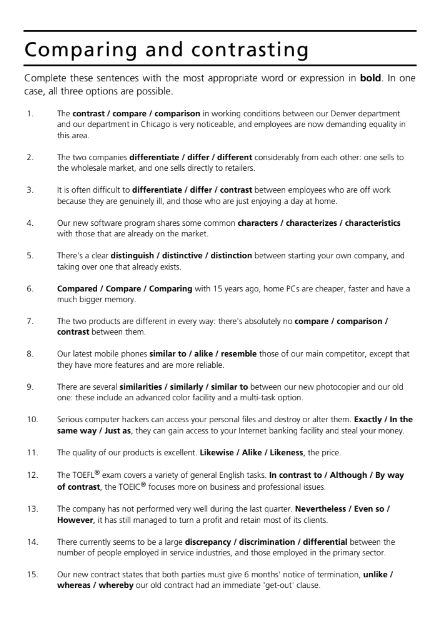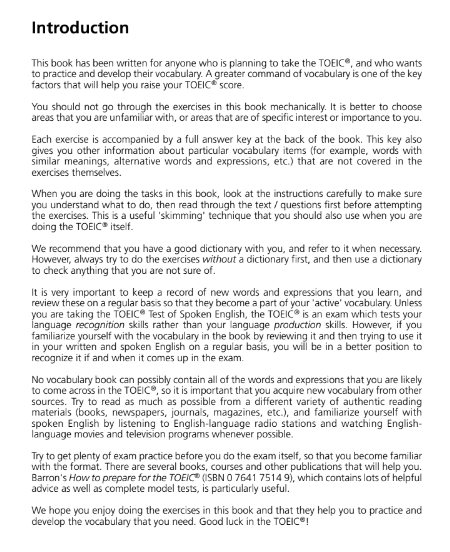


Mục lục
ToggleComparing and Contrasting
For reference see Easier English Intermediate Dictionary (0-7475-6989-4).
- The contrast / compare / comparison in working conditions between our Denver department and our department in Chicago is very noticeable, and employees are now demanding equality in this area.
- The two companies differentiate / differ / different considerably from each other: one sells to the wholesale market, and one sells directly to retailers.
- It is often difficult to differentiate / differ / contrast between employees who are off work because they are genuinely ill, and those who are just enjoying a day at home.
- Our new software program shares some common characters / characterizes / characteristics with those that are already on the market.
- There’s a clear distinguish / distinctive / distinction between starting your own company, and taking over one that already exists.
- Compared / Compare / Comparing with 15 years ago, home PCs are cheaper, faster and have a much bigger memory.
- The two products are different in every way: there’s absolutely no compare / comparison / contrast between them.
- Our latest mobile phones similar to / alike / resemble those of our main competitor, except that they have more features and are more reliable.
- There are several similarities / similarly / similar to between our new photocopier and our old one: these include an advanced color facility and a multi-task option.
- Serious computer hackers can access your personal files and destroy or alter them. Exactly / In the same way / Just as, they can gain access to your Internet banking facility and steal your money.
- The quality of our products is excellent. Likewise / Alike / Likeness, the price.
- The TOEFL® exam covers a variety of general English tasks. In contrast to / Although / By way of contrast, the TOEIC® focuses more on business and professional issues.
- The company has not performed very well during the last quarter. Nevertheless / Even so / However, it has still managed to turn a profit and retain most of its clients.
- There currently seems to be a large discrepancy / discrimination / differential between the number of people employed in service industries, and those employed in the primary sector.
- Our new contract states that both parties must give 6 months’ notice of termination, unlike / whereas / whereby our old contract had an immediate ‘get-out’ clause.
Exercise 1: Computers and Information Technology
CD drive, components, CPU (Central Processing Unit), desktop, DTP (desktop publishing), flash-drive, hard disk, hard drive, keyboard, laptop, load, memory, monitor, mouse, printer, scanner, software, spreadsheet, USB port, word processing
This is my new (1) computer that sits on top of a table or desk (I’ve also got a (2) small computer which can be carried or placed on your knees). As you can see, there are six main (3) parts to it. The first is the (4) part of the computer that runs it and controls what it does, and this is the most important bit. It carries the (5) part that stores and controls the flow of information, including the (6) round thing that is used for storing information. Mine has a particularly high (7) capacity for storing information, which means that it’s much faster than most. It came with its own (8) computer programs package (including (9) writing, checking and changing texts, (10) calculating in columns of figures, and (11) producing texts and pictures for magazines packages). You can also (12) put in other programs using the (13) sliding tray for carrying round, plastic, information-holding things, or the (14) hole for connecting computer parts to one another (into which you can put a (15) small plastic and metal stick which can hold a lot of information). The other five parts of the computer are the (16) screen that lets you see what your computer is doing, the (17) flat thing with the letters and numbers on it that let you control the computer, the (18) machine that lets you make copies of the documents that you create on your computer, the (19) device for making color copies of photographs and other documents which you can put onto your computer, and last but not least, the (20) device that you hold in your hand and move across your desk to control the cursor.
Exercise 2: IT Vocabulary
access, attachment, bookmark, browser, chatrooms, crashing, delete, download, email, homepage, Internet, keywords, links, log on, log out, online, pop-up, provider, search engine, spam, upgrade, virus, website
Now, in my opinion, the best thing about modern information technology is the (1) network that links millions of computers from around the world. Once you’ve got yourself a / an (2) company that allows you (3) entry, and a (4) program that finds information you can start using this. It’s especially useful if you want to get information about something, go shopping or (5) transfer information, games, music, etc., onto your own computer. You can even ‘talk’ to other computer users in (6) special places where you can leave messages and get instant replies. Most companies have their own (7) special computer pages which you can look at. Let me (8) turn the computer on, enter my code and access the computer system, and I’ll show you ours. OK, here we go. Oh no, another (9) advertisement that suddenly appears on the computer screen. How annoying. Let me just remove it. That’s better.
Now, I can never remember the exact address of our company, so first of all I’ll type it into the (10) program that helps you find the information you want. OK, A & C Black Publishing. The computer identifies the (11) most important or main words and then gives me (12) connections to a list of possible sites. This one looks right: www.acblack.com. I’ll click on that. Bingo! Here’s our (13) front page. You can use this to find the different books that we publish, and if you want you can even buy them (14) through the computer. Hmm, this book looks good: Check Your English Vocabulary for TOEIC®. Now, before I (15) exit this site, I’ll just (16) add it to my list of favorites so that I can find it more quickly next time.
Perhaps the most important thing, however, is (17) a special electronic letter-sending facility, which allows you to communicate with people around the world in an instant. Let me quickly check mine. Oh dear, nothing very interesting. Mainly a load of (18) unwanted advertising. I’ll just (19) remove it: I don’t particularly want to rent a vacation home in Mexico, have my future read by one of America’s top astrologers or buy a phone that lets you smell the person you’re talking to. There’s something here from my sister with a / an (20) document or file that has been sent with it. You have to be careful with these: sometimes they contain a (21) hidden routine placed in the program that destroys or corrupts files. If you open it, it can do all sorts of horrible things to your computer. I had one last week that kept (22) shutting down my computer. I do have a protection package, but it’s a bit out of date: I really ought to (23) bring it up to date.
Condition and Requirement
Rearrange the letters in bold.
- As long as customers continue to demand the BD17 model mobile, Telelink will continue to produce it. If demand falls, the line will be discontinued.
- seusln we receive your payment within ten days, we will have to start charging you interest.
- We will continue to offer you interest-free credit no incotnido atth you maintain regular repayments…
- vogrnipid ttha…
- retncopiinod…
- ni eacs fo…
- ni het nvete fo…
- aputonstili…
- nidncoalitoun…
- sumsagin hatt…
- autonmsspi…
- quereesisitpr…
- remst and ioctnsodin…
- nmreiretque…
- niifagl ttha…
- ehewotris…
Different situations
For reference see Easier English Intermediate Dictionary (0-7475-6989-4).
If it is formal, it should begin with a polite salutation. If you don’t know the recipient’s name, call them Sir or Madam, but if you know their name, always use it (beginning with Mr. for men and Ms. for women). It should be brief, clear and to the point. End with Yours sincerely if you know the recipient’s name, or Yours faithfully if you don’t. Some people end theirs with Yours truly. Only use Best wishes at the end if it is informal.
What is the speaker talking about?
Mr. Jenkins: What’s the schedule for today?
Ms. Ranscombe: Well, after everyone has arrived and registered, there will be coffee in the reception area. This will give everyone a chance to meet their fellow delegates and do some networking. This will be followed by a plenary session in the main hall: I believe the speaker will be giving a presentation on new marketing trends. After a break at 11 o’clock there will be different seminars for areas of special interest. The afternoon will consist of a series of workshops, and then there will be an evening reception and dinner for all the participants.
Where are Mr. Jenkins and Ms. Ranscombe?
Ms. Akkabar: Hello, Mr. Andrews. What can I do for you today?
Mr. Andrews: I originally just wanted a checkup, but two days ago I lost a filling, and I think one of my crowns is coming loose. I guess that will be expensive to fix.
Ms. Akkabar: Well, it might be, but we have various payment options that might spread the cost. Take a seat and I’ll have a look. Hmm. Your gums look a bit sore. How often do you brush and floss?
Mr. Andrews: About five times a day!
What is Ms. Akkabar’s job?
Our company is committed to helping employees learn more about their jobs and develop their skills, so we run regular sessions to facilitate this. These are usually in the form of seminars and workshops, and cover a wide range of subjects, including leadership skills, problem solving, decision-making, negotiation skills and interpersonal development. Our employees can then revise and practice these skills through our online program which is run on the company intranet.
True or false: The speaker thinks that his employees don’t work hard enough.
Is that Amanda Mellors? Oh, well, could you put me through then? You can’t get through? Oh, her line is engaged. I see. No, I can’t hang on, I’m afraid. Could you give me her extension? It’s confidential, is it? Well, could you ask her to get back to me later? Hello? HELLO? I don’t believe it, I’ve been cut off.
What is the speaker doing?
Each employee has at least one of these a year. Each session lasts about 45 minutes, and we ask them various questions. For example, we ask them if they think the work they are doing meets the correct standards and whether or not they have met the objectives we have set for them. We also like to know if they are happy with the way their career is progressing, if they would like to do something more challenging, and also if they receive sufficient encouragement, praise and motivation from their managers.
Rearrange the letters in bold to make words: The speaker is talking about his company’s fatfs spapialar program.
My boss is abrasive, bigoted, conceited, confrontational, critical, insensitive, intolerant and obstinate.
Does the speaker have a good boss or a bad one?
Ms. Collins: You will be expected to oversee the work of the production department, agree product specifications with sales departments and time schedules with the stock control department, ensure the product is manufactured according to agreed specifications, inspect the quality of the finished product, produce sales reports for the head office, visit and negotiate with suppliers on base material prices and deal with everyday problems as they arise.
Mr. Sheppard: Anything else?
Ms. Collins: Yes. Make my coffee. Two sugars and plenty of cream, please.
What is Ms. Collins explaining to Mr. Sheppard?
Ms. Colley: What’s your diagnosis? Is it serious?
Mr. Sagala: Oh no. You have a throat infection, but it’s fairly minor and nothing to worry about.
Ms. Colley: Can you treat it?
Mr. Sagala: Oh yes, I’ll give you a prescription for antibiotics. They should cure it. But make an appointment to come back and see me in a week. It’s contagious, so I suggest you take a few days off work. I’ll write you a sick note.
How does Mr. Sagala make his living?
Mr. Samson: This says we owe them $180, but the order was only for $131.
Ms. Grant: Yes, but that price was exclusive of tax.
Mr. Samson: I know, but even with tax it should only come to $165.
Ms. Grant: That’s true. Oh, hang on, look what it says at the bottom. Package and delivery: $15.
Mr. Samson: Oh, right. Well, I guess we had better pay them. Who do we make the remittance payable to?
Ms. Grant: Oh, we don’t need to send them anything. The payment will be automatically deducted from our account at the end of the month. Unfortunately, what this doesn’t show us is the import duty we will have to pay. I guess we can expect to get a bill from Customs soon.
What are Mr. Samson and Ms. Grant looking at?
Look at the situations again, and highlight the key words and expressions that helped you to identify what each one is about.
Earnings, rewards and benefits
For reference see Easier English Intermediate Dictionary (0-7475-6989-4).
Complete the first part of each word in bold in sentences 1–32 with the second part in the box.
- an, -ance, -ance, -ans, -ary, -ated, -ation, -ay, -ble, -count, -ction, -dancy,
- den, -dex, -diture, -ement, -ensurate, -eration, -et, -faction, -fit, -ge,
- hting, -imum, -ise, -ission, -kage, -ked, -lement, -me, -nus, -ock, -ome,
- ormance, -oss, -ring, -roll, -shake, -sion, -slip, -te, -time, -tions, -tive, -ve
- A wage is money that is normally paid to an employee on a weekly basis, and a sal____ is money that is usually paid to an employee on a monthly basis.
- Remun____ is the formal word for money that an employee receives for doing his / her job.
- When we work for more than the normal working time, we say that we work (and therefore earn) over____.
- An automatic and regular increase in pay is called an incr____.
- Money that is removed from our earnings to pay for tax, national insurance, etc., is called a dedu____.
- The min____ wa____ is the lowest hourly wage which a company can legally pay its employees.
- Time for which work is paid at twice the normal rate (for example, on national holidays) is called dou____ ti____.
- A pen____ pl____ helps people to save money for when they retire from work.
- When you want more money for the work you do, you might ask your boss for a ra_____.
- If an employee needs some of his / her wages paid before the usual pay day, he / she might ask for an adv____.
- A pay____ shows an employee how much pay he / she has received, and how much has been removed for tax, insurance, etc.
- An extra payment made in addition to a normal payment (usually received by sales people for selling more than their quota) is called a bo____.
- A pay____ is the list a company keeps that shows all the people employed and paid by that company.
- A rewards pac____ is the money and other benefits offered with a job.
- A weig____ is an additional amount of money paid to an employee to compensate him / her for living in an expensive area.
- By law, American companies have to give their employees the right to take paid vacations: this is known as lea____ entit____.
- Inc____ is another word for the money that people receive for working. The money that they spend is known as expen____.
- For some people, the money that they earn for doing a job is less important than job satis____ (the pleasure they get from doing their job).
- A sales person usually earns a percentage of the sales value of the product or service he / she sells: this is called a comm____.
- Some companies offer their employees st____ op____, which means that the employees can buy stocks at a price lower than the normal price.
- Some companies have incen____ pl____, where they offer their employees extra rewards and benefits for good attendance, increased productivity, etc.
- The amount of money an employee receives each hour, day, week, etc., is known as an hourly / daily / weekly ra____.
- If an employee loses his / her job because the company doesn’t need or can’t afford to keep him / her, they might receive redun____ p____.
- Some companies offer their employees a dis____ on the product and services they sell, which means that the employee can buy them for less than the usual price.
- If an employee takes a job in another town or city which is a long way from his / her original home and place of work, he / she might be offered a reloc____ allow____.
- Some companies have a policy of pro____ sha____, where some or all of the money that they make is given to their employees.
- Gr____ is an adjective used to describe an employee’s earnings before tax, national insurance, etc., have been removed.
- N____ is an adjective used to describe an employee’s earnings after tax, national insurance, etc., have been removed.
- When the money that an employee receives rises automatically by the percentage increase in the cost of living, we say that it is in____-lin____.
- If the amount of money an employee receives depends on how well he / she does his / her job, we say that it is perf____-rel____.
- When the money that an employee earns is based on age, experience, qualifications, position in the company, etc., we say that it is comm____.
- When an employee leaves his / her job after a long period with the company, he / she might be offered a large amount of money known as a gol____ hand____.



